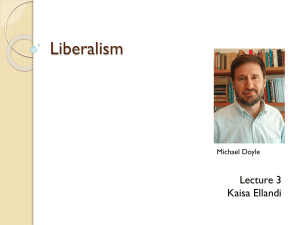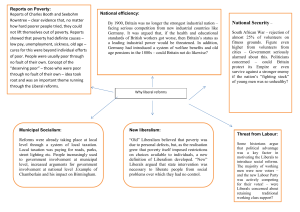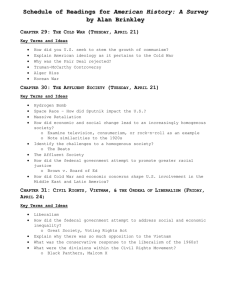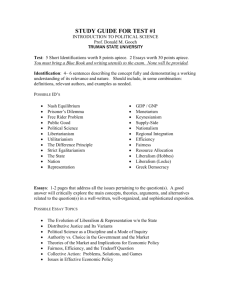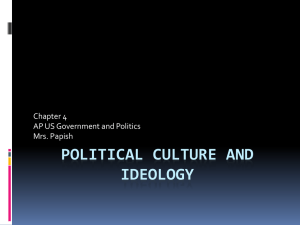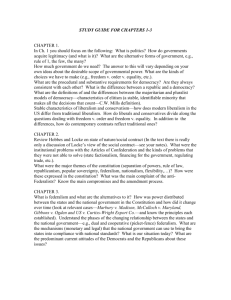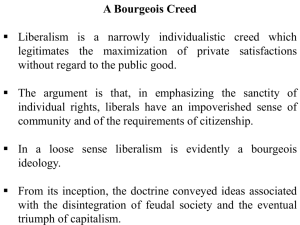Freedom, Community, Liberalism, and Conservatism: Was Mary liberal?
advertisement
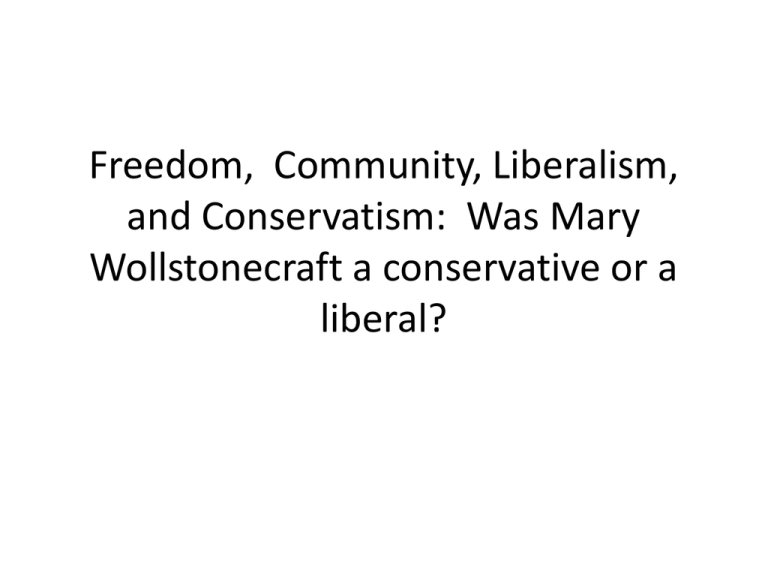
Freedom, Community, Liberalism, and Conservatism: Was Mary Wollstonecraft a conservative or a liberal? Are your positions on politics and economics more…. • • • • • A. Conservative B. Liberal C. Left-Liberal D. Ultra Conservative E. Don’t Know Theoretical basis of Liberalism • Hobbes, Locke, Rousseau: We are born free but because we are rational, we trade natural liberty for civil liberty when we freely give our consent in the social contract. • Mill: A natural right to individual freedom that government must not interfere with and must protect. • Smith and Ricardo: Market freedom and free trade Review: Individual Freedom • Does not mean that people are selfish (Hobbes, Smith) but a claim about FREEDOM (John Stuart Mill) • I am only obligated if I give my consent to be obligated…. (Hobbes, Locke, Rousseau) • No collective responsibility • Locke: legitimate authority is based on consent – Because “by nature, all free, equal and independent, no one can be put out of this estate, and subjected to the political power of another, without his own consent.” Liberalism: A theoretical l framework and political program promoting freedom • Assumptions – All are equally entitled to life, liberty, and pursuit of property: A Natural right– right to do anything you want that does not hurt anyone else. – Rationality and reason – All people are created equal and have the same rights – People must be free to “truck, barter, and exchange” and government must stay out of the market except to rotect free competition • History – First: Freedom from oppressive government—less government to restrain people (negative freedom) – Over time: government’s role is to protect freedom and equal rights—more government to protect people and guard equal rights – The four freedoms (positive freedom) • The Controversies rights and freedoms Who defines “the good life?” The state Democracy Distribution Justice and Freedom: Liberalism and the Neutral State • If we are free individuals, Justice means the freedom to define “the good life” for ourselves • This freedom is the justice that the neutral state should uphold – The state should support the freedom of all---men AND women – Opposite of what Plato and Aristotle thought the purpose of government is…. • Should the state tell free individuals what “the good life” is? • Liberal Government’s role in the market: enable individual freedom—what is the best way to do this? – Egalitarian views—government should ensure material conditions necessary for free choice (Smith, Wollstonecraft) – Libertarian (conservative) views • Is freedom of choice an adequate basis for a just society? Liberal Theorists: The “Freedom School” 1780 Last Witch burned in Europe 1784 American Society to Abolish Slavery 1787 British Society to Abolish Slavery Hobbs Locke Rousseau Human Nature: Individual Reason Politics John Stuart Mill Thomas Jefferson Behavior: Individualism and self interest Economics 1776 American Revolution 1776 Wealth of Nations published 1792 Wollstonecroft “Vindication” Locke Mill Jefferson Governing Principle: Political Freedom Freedom to “truck, barter, and exchange, property ownership Adam Smith John Locke Individual Freedom as a “right” Individual ____ freedom to compete Goal: Freedom is Happiness We each define The good life for ourselves Historical evolution of Liberalism •Core commitment: Freedom and antidote ascriptive • The theory is broady called Liberalism—whose core commitment is to freedom to Liberalism encompases the values of both political and economic freedom: - for example, individual freedom, political participation, private property, and equality of opportunity that most liberal states share, although none has perfected identities them all. liberalism (the opposite of collectivism) puts the onus on the individual. It heavily promotes individual freedom/liberty...and with that freedom and liberty, greater individual responsibility with less •Historically liberals activists, fighting for freedom government (or outside authority)were intervention. Live and let live. from oppressive governments…wanted state to protect • Historically, Liberals wanted – freedom from capricious authoritarian governments, individual – freedomfreedom from the confiningonly ideas of religion, t – hey were opposed to inherited wealth of a few “great” families who owned large tracts of land. •Over liberals split: some wanted more – time: They hated slavery. – They welcomed immigration and freedom of movement in general. government intervention – They supported the right to divorce. to protect people and guard – They argued that legitimate authority was based only on popular consent. equal rights • Liberals sought to build institutions that foster and protect the individual’s right to enter into contracts, •Negative Freedom: freedoms own property,and buy andPositive sell, speek and practice religion freely,The choosefour government officials, and be that protected in those rights from the state and from others in society who would thwart them. many liberals say government should protect: freedom • These are all things that we take for granted because we live in a society characterized by liberal institutions, both political and economic.. of speech, freedom of worship, Freedom FROM want, Freedom FROM fear Liberalism and Democracy Liberals did have doubts and worries about majoritarian politics. Mill, for instance, was naturally distressed at the election of Louis Napoleon to the presidency of the Second Frenchprovides Republic by universal manhood suffrage. Liberalism the theoretical basis for • Nevertheless, despite practical reservations, liberals provided a strong theoretical democracy: basis for democratic politics as it eventually developed. • "Freedom to choose," liberals argued, includes freedom to choose the laws under --Freedom to choose governments: Voting which all citizens must jointly live. It is not surprising, therefore, that the two main political--Freedom institutions of every liberal regime are the suffrage and a representative to choose laws that everyone has to legislature. •live Liberal polities, however, while based government on free and periodic elections, have all with: representative instituted a variety of restraints on majority rule. How can these limits be reconciled with a commitment to democracy? First, the present majority must not •But still……liberals feel that majorities have to be be allowed to deprive future majorities of the right to correct earlier mistakes. restrained. Second, the present majority needs the willing cooperation of outvoted minorities, whose personal rights must therefore be protected. Third, without freedom of rightscensorship must be protected…..the debate,--minority shielded from majority and bullying, elites will capture power and ensconce themselves beyond criticism, eventually confiscating the majority's majority own power.needs their cooperation • Theories of Political Economy in which States define “the good life” for their citizens • Utilitarianism: The state defines the most desirable way of life…….individuals do not have a choice: greatest happiness for the most • Aristotle/Socrates: the good life is realizing our true nature, developing our human capacities—construct the kind of state that helps---then develop “rights” • Hobbes “The Good” is peace and protection—the state must realize that good through power • Machiavelli: The “Good” IS State Power • The state’s definition of the good life defines the nature of rights --- definition of the good shapes which rights people should have Liberalism’s forms of Political Economy and the Role of the State • liberal thought takes a number of forms, depending on how close it is to the freedom or community schools. • On the freedom end of the continuum, we have Libertarians and classical liberals, who we now call economic conservatives – Individuals define for themselves the good life…the state must remain neutral in this definition – The state must provide the laws that protect the individual • At the community end are Egalitarian Liberals and Social Conservatives – Moral community codes and “positive freedom” define the good life (in either material –Egalitarian Liberals—or moral – social conservatives--terms – The state must uphold those codes and positive freedom The Liberal-Conservative continuum: From Freedom to Community Freedom -- Community Liberalism’s forms of Political Economy And Role of the State Freedom Liberalism Libertarianism State’s role is to preserve negative freedom, permit individuals to define for themselves “the good life” Conservatism Community Egalitarian/Communitarian Liberalism Preserve Individual Freedom and state redistribution to protect community and provide positive freedom that defines “the good life” Classical economic liberalism Social/ Political Conservatism State’s role is to preserve competitive markets State must restrict individual freedom to preserve sommunity and uphold moral codes of commuinity Who was the Real Mary Wollstonecraft?
